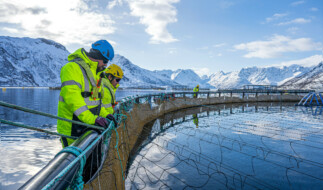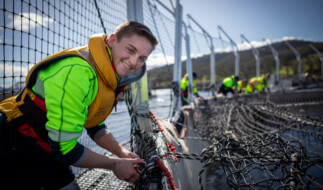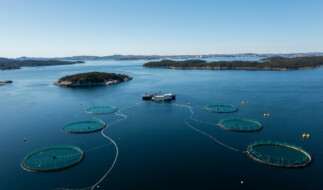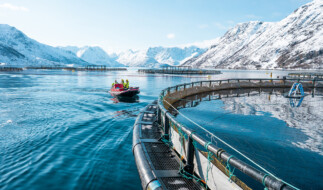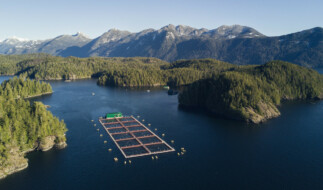Responsibility is at the heart of our vision for the sustainable future of aquaculture
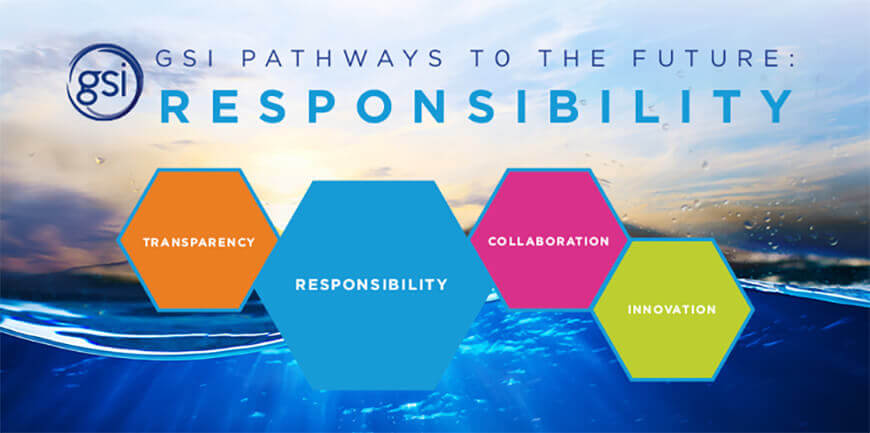
This June saw the world’s attention turn to the oceans, with World Oceans Day on 8 June and the G7 meeting in Canada focusing on the future of this shared global resource. Whether it be fresh water availability, or the amount of plastic being found in the ocean, there was one clear takeaway from both milestones — how can we as individuals, businesses and governments, take responsibility to ensure the health of our oceans?
For us, as members of the Global Salmon Initiative (GSI), responsibility has been an integral component from the beginning; to achieve GSI’s vision for the future of aquaculture, we know that as ocean users we play an important role in not only acting as responsible corporate citizens, but also in ensuring the responsible use of the oceans for future generations. But what does this mean on a practical level, and how is this philosophy being integrated into our values and actions?
Our efforts to be responsible ocean stewards can be broadly divided into three main categories:
- A reduced environmental impact of salmon farming
- Social contributions
- Contributing to the global mission to ensure healthy oceans
A reduced environmental impact of salmon farming
Compared with beef, pork and chicken production, salmon aquaculture typically generates fewer greenhouse gas emissions, uses less land and fresh water, and is more efficient at converting feed into edible protein. However we are not resting on our laurels; we know sustainability does not have a fixed endpoint and therefore we are constantly striving to achieve the highest standard and most eco-efficient performance possible for the salmon farming industry.
Traditionally, aquaculture has been criticized for its high use of wild fish in feed, but in recent years this has changed drastically. The common feed-to-fish ratio for farmed salmon is now 1.2:1, and the aim is only to lower this ratio even further.1 As GSI members we are working closely with our Associate Feed Company members to further improve the sustainable use of marine resources, and are looking at new technologies, such as algae and omega-3 rich crops, to help supplement the use of marine ingredients and ensure sustainable wild fish stocks.
As part of the many ways we are improving and making progress on our environmental performance, continuous improvement is a critical responsibility. This is why we believe that, as responsible salmon farmers, our actions should be transparently reported for our stakeholders.
Benchmarking is important because, as responsible corporate citizens, we are accountable to a number of different stakeholders – our customers, shareholders and the local communities in which we operate. Whether it is demonstrating responsible use of resources or documenting the health of our fish, we are transparent about what we are doing to ensure we instil trust in the relationships we have with our stakeholders.
For this reason, all GSI members have committed to achieving 100% Aquaculture Stewardship Council (ASC) certification across all their farms. The ASC certification is widely recognized as the most rigorous assessment of responsible aquaculture: in order to achieve ASC certification, fish farms must meet the standard’s 154 criteria, which include metrics for fish welfare, reduced environmental impact and social contribution. A demanding standard was deliberately chosen, because it should not be an easy task for all farms to reach the certification quickly. We have therefore used the ASC standard as a reference point for our progress, and anyone can track how we are doing via our annual Sustainability Report.
Social contributions
Seafood – specifically farmed salmon – is among the healthiest proteins on the planet. It’s packed full of omega-3 fatty acids, iron, selenium, B vitamins and many other essential nutrients that have been shown to reduce the risk of heart disease. But behind these benefits is an industry that plays a huge role in the communities in which it operates – which are often small, remote villages. As GSI members we directly employ over 20,000 people and that doesn’t include any part-time workers or workers who support our value chain.
Responsibility means treating our employees fairly, but social responsibility also goes beyond economic contribution. It also means engaging with and giving back to the communities in the areas where we operate. Whether it is through improving awareness and understanding of what salmon farming is, working with local communities to promote healthy ocean environments, or even supporting local charities or events, every company has a number of different activities in place to improve their engagement with the local population. You can find out more about these by viewing the company community engagement pages in the Sustainability Report or watching a few of our videos, and some examples of the way we contribute are described below.
AquaChile – helping pupils in a remote community
One of AquaChile’s farms is located in the rural region of Isla Grande de Chiloé, Región de Los Lagos in Chile. There a single school on a neighbouring island, but the lack of transport to and from the island meant that teaching supplies and resources were in short supply. When there was a risk of the school closing, AquaChile offered to use its farm boat to transport a teacher from the mainland to the school every day, which has improved the facilities available to the students of this small school.
Bakkafrost – keeping local beaches clean
2017 was a big year for plastic. People around the world were hit with headlines and devastating images of the effects of human pollution on our oceans. Despite the remote location of the Faroe Islands in the Atlantic, plastic still ends up on their many otherwise unspoiled beaches. In response, GSI member Bakkafrost organized an event in June 2017 for which 17 of its farmers came together with other fish farmers in the Faroes to help clean up the beaches around the islands over the course of a week – collecting all types of plastic and waste that had ended up there.
Bakkafrost also sponsored a beach clean-up in the southernmost of the Faroe Islands, Suðuroy, where 55 large storage sacks of rubbish were collected from Trongisvágsmegin beach by 45 volunteers in May 2017. Bakkafrost plans to repeat this week-long initiative this year and will continue to support similar environmental community initiatives.
Contributing to the global mission to ensure healthy oceans
Our oceans are under threat – overfished, polluted and taken for granted, and while as individual ocean users we each have our own actions to take accountability for, we also need to view the oceans from a global perspective and take action at a much wider scale if we are to protect them and their valuable resources for future generations. The only way this will be possible is through partnerships and global collaboration.
The UN Sustainable Development Goals (SDGs) have provided a framework for how businesses, research institutes, governments and civil society can help address a number of key global issues, with the aim of ending poverty, protecting the planet and ensuring prosperity for all. Of these goals, the most significant to the GSI is SDG 14, Life Below Water, which addresses the conservation and sustainable use of the oceans, seas and marine resources. GSI members have voluntarily committed to achieving SDG 14, because we believe that GSI has an important role to play in responsible ocean use, on the basis of our model of pre-competitive collaboration. This model allows us to facilitate greater knowledge transfer, share best practices and promote more industry innovations – all with the aim of accelerating the industry’s sustainability performance and ensuring that farmed salmon is a responsible food choice.
